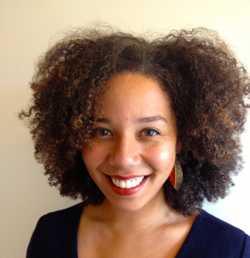Meeting new board members: Amanda Alexander
Amanda is a Soros Justice Fellow and an attorney in the University of Michigan Law School Child Advocacy Law Clinic. She directs the U of M Law School Prison & Family Justice Project, which serves families divided by incarceration and the foster care system using a combination of direct representation, know-your-rights education, targeted litigation, and advocacy.
by Leah Sakala, January 20, 2015
Next up in our blog series introducing several accomplished new members of the Prison Policy Initiative board: Amanda Alexander. Amanda is a Soros Justice Fellow and attorney in the University of Michigan Law School Child Advocacy Law Clinic. She directs the U of M Law School Prison & Family Justice Project, which serves families divided by incarceration and the foster care system using a combination of direct representation, know-your-rights education, targeted litigation, and advocacy.

What does your work focus on?
Amanda Alexander: As a lawyer and advocate, my work focuses on helping families thrive by fighting for change in our criminal justice system. Two years ago I moved home to Michigan to start the Prison & Family Justice Project, which serves families impacted by incarceration. A single arrest can trigger all sorts of consequences for a family—it might cause a mother to lose her job or housing, or cause children to enter foster care. The Prison & Family Justice Project represents incarcerated parents who may be at risk of losing their parental rights, and offers family law workshops in jails, prisons, and re-entry centers to help parents maintain ties with their children and provide for their care. The project also trains Department of Human Services workers and other child welfare professionals on how to engage incarcerated parents. My work also involves systemic advocacy around several of the issues PPI tackles, such as removing barriers to communication and visitation for families with incarcerated loved ones.
Why did you decide to join the PPI board?
AA: I admire PPI’s work. Whenever they put out a new report, I’m eager to read it and share it with friends and colleagues who I know will find it useful in their own work. Spreading the word about PPI comes naturally, so I’m honored to support its work as a board member.
What do you think is most unique about the Prison Policy Initiative and the projects it takes on?
AA: PPI is about results. It takes on very targeted projects, does excellent research, and puts out a bold message—the result is often concrete policy change within a short period of time. PPI shaped the conversation about prison gerrymandering, and won victories in Maryland and New York that it’s now replicating around the country. PPI’s role in the Prison Phone Justice campaign can’t be overstated—they played a key role in capping the cost of inter-state prison phone calls. Now they have their sights set on capping the cost of in-state calls, which will be a huge victory for families. PPI takes on ambitious fights — and wins.
What’s something that you wish more people knew about the Prison Policy Initiative?
AA: It’s amazing to me that Peter and the PPI staff are so clued in to what’s happening at the federal level and at very local levels. They manage to stay on top of what’s happening in county jails around the country, and to support local partners in struggles at the city level. I wish more people knew the breadth of PPI’s network, and what a great partner it is to organizations at the local and national levels.
Amanda also chatted with us on camera recently about how she uses PPI’s work and why she joined our board:



